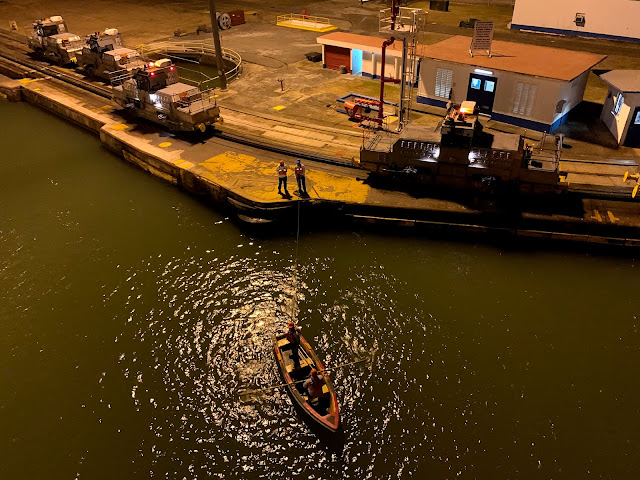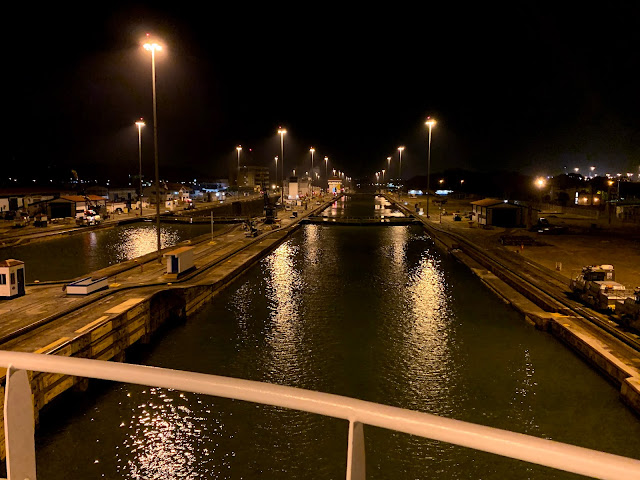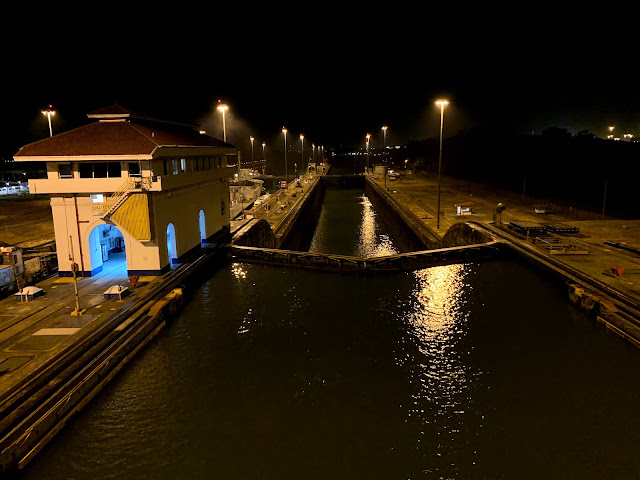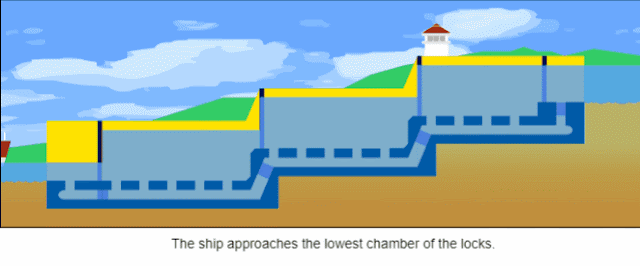Pai, famously known as Thailand’s Switzerland, is a small, beautiful hilly town up in the mountains in northern Thailand's Mae Hong Son Province. The town sits in a valley on the banks of quietly flowing Pai river (hence the name Pai). Pai is mostly covered by vans from Chiang Mai, instead of buses, as the roads are really curvy, going up and down the hills with a lot of narrow hairpin curves. Chiang Mai to Pai takes approximately 3hrs by van.
In Chiang Mai, most of the van services to Pai starts from the bus station called “Arcade”, which is about 20-30 mins from the Chiang Mai airport. One has to choose seats while taking the ticket. Bags were secured on top of the van with tarpaulin sheets. I was a bit worried about rain, after watching the dark, cloudy sky. it didn’t rain and the van reached Pai in 3 hours. An amazing route to travel. I did drive a rented car up to Pai, Mae Hong Son, Doi Inthanon and back to Chiang Mai 4 years back, along with my friend Anish as the navigator. One will surely love to drive these roads, just for the pleasure of driving. However, be careful not to drive these curvy mountain roads during the night, which we dangerously did during the previous trip. Some the curves are a bit dangerous. Fog and mist can also trouble you in the winter.
Pai van station is a small area in the main street. In the evening, this will be converted to a walking street, full of souvenir shops and restaurants.
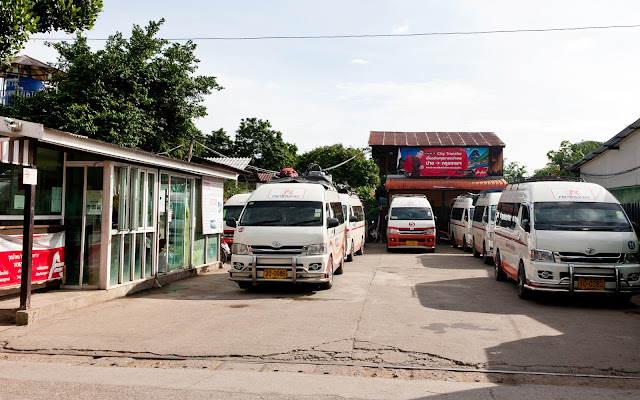 |
| Van Station, Pai |
 |
| Pai City Walking Street during the day |
Mostly guesthouses and resorts are available for lodging in Pai. My “BaanTawan House” was a small guesthouse near the Pai river and it is just walkable distance from the van station. I just dragged my bag along the road to the hotel. An amazing hotel, seems like an antique wooden house converted to a guesthouse, in a beautiful setting next to the quietly flowing, greenish Pai river. It was almost 7.30pm, but still there was enough sunlight, seems like the sunset is around that time here in Pai.
Pai is a small town and if you are alone, it is best to rent a motorbike to roam around. Most of the attractions are within 30km. Bikes rentals are so cheap, from 100baht to 200baht per day, depending on the model. You can choose from a wide variety of motorcycles from gearless to big cruisers. Mostly, tourists rent motorcycles to drive around the city. There are a very few car rentals, in fact I come across only one. So if you go in a big group, make sure to book cars in advance.
Wat Phrathat Mae Yen
Rented a gearless motor bike from a shop on the main road, outside the hotel and drive straight to the famous Wat Phrathat Mae Yen temple through the curvy roads that go uphill. It is a small temple on the side of mountain, behind Mae Yen village. A completely deserted, long stretch of ancient steps covered with dried leaves was also seen going up the hill, to the temple. There is a very big, white budha statue on the side of the hill, that can be seen from far away and I went straight to it. I believe it is a recent addition to the temple. It is a great place to sit and admire the amazingly beautiful view of the valley and the Pai town. I told myself, not to rush to the next place, better take some time to sit there and breath fresh air and think about nothing.
 |
| Big Budha statue at Wat Phrathat Mae Yen |
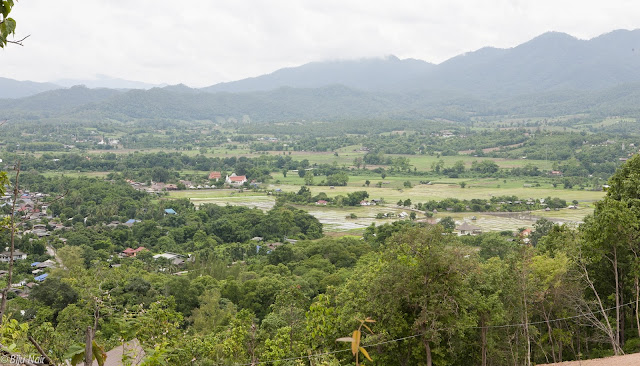 |
| View of the valley from Wat Phrathat Mae Yen |
 |
| Big Budha statue at Wat Phrathat Mae Yen |
There were 2 small temples below and the one behind has 3 chedis as well. There is a sitting area as well, where you can sit and enjoy the view of the valley. An amazing place, probably best suited to visit in the evening to watch the sun set.
 |
| Wat Phrathat Mae Yen |
 |
| Wat Phrathat Mae Yen |
 |
| Wat Phrathat Mae Yen |
Tha Pai Hot spring
Amazing views on both the sides of the road to the hot spring. , different kind of vegetable fields, like peanut, corn, cassava etc. They even have a small taek plantation, however the trees are very small, probably recently planted.
The hot spring was not that far away from the temple. Entrance fee for foreigners is 300baht, which is a bit disappointing. An additional 20baht for the motorbike. They have constructed hot water pools for visitors, close to the entrance. The hot water oozes out from a few places within that area and the temperature varies from places to place. At one place, it was around 80degree and the sickening smell of sulpher was in the air. After spending some time walking around, I came back to the pool and sat on the side steps dipping my legs in the hot water. At first I felt the heat, but after a while, it was very soothing.
 |
| One of the hot springs |
 |
| Smoke coming out of the hot spring |
 |
| boiling eggs at one of the hot springs |
Pai Memorial Bridge
The memorial bridge was built in 1941 by the Japanese. During the second world war, they were on the way to attack Burma and they forced the villagers there to build a bridge for them to cross the Pai river. But in 1945, they burned the bridge while retreating. The villagers built another wooden bridge later, but was destroyed in 1973 by heavy flooding in the Pai river. Another Steel bridge was built in 1976 and is called the Pai Memorial Bridge. This looks like a popular spot for photoshoots.
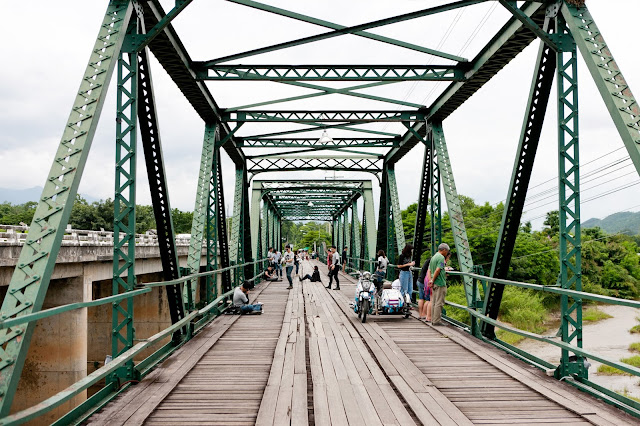 |
| Pai Memorial Bridge |
 |
| Pai Memorial Bridge |
 |
| Rafting in the Pai River, below the bridge |
Pai Canyon
Next stop was a place popularly known as Pai Canyon. It is a kind of ridges and canyons carved by various kinds of erosion and mainly made up of yellow sandstones. The cliffs were very high and steep at places. Not many people attempted to see around this area as it was not that easy to scale down some of the cliffs and ridges. It was even slippery, at places.
 |
| Some of the ridges at the Pai Canyon |
 |
| Some of the ridges at the Pai Canyon |
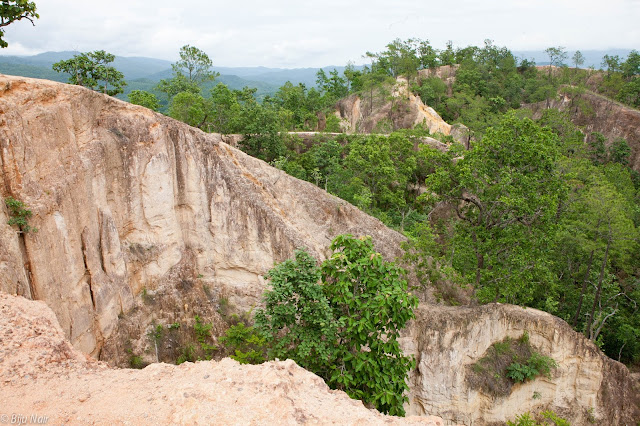 |
| Some of the ridges at the Pai Canyon |
 |
| Panoramic view, Pai Canyon |
 |
| Panoramic view, Pai Canyon |
 |
| Panoramic view, Pai Canyon |
Land split
This is a phenomenon of land splitting into two, mostly due to an earth quake. This was happened in 2008 for the first time, during the night. The crevasse is steep and deep and the separation is about 2meters. And it repeated in 2009 and 2011. It is located up in a small hill and there is no ticket to visit this place. The owner of the land is running a small fruit stall close to the road. Just a small tip for the snacks and drinks is enough for him.
 |
| Land split |
 |
| Land split |
 |
| Land split |
 |
| Land split |
Wat Nam Hu
Santichon Chinese village & Yun Lai view point
Mo Paeng waterfall is about four kilometres from Santichon Chinese village. It doesn’t look like a real waterfall. A few local boys and girls were playing in the water with sticks.
 |
| Mo paeng waterfall |
 |
| Mo paeng waterfall |
Wat Sri Don Chai, probably one of the ancient temples in Pai, with two big white Lion (I think) statues at the gates. Lot of paintings on the wall, beautifully decorated red colour wooden ceiling, pillars were painted with black and golden colours. Though it is small in size compared to many other temples, the richness in art and ambience was amazingly impressive. This was so far one of my favourite temples in Thailand.
Wat Luang is another budhist temple in the Pai city. The big white chedi with golden artwork is the main attraction there. The big chedi is surrounded by twelve small chedis.
 |
| White colour Chedi, Wat Luang |
 |
| White colour Chedi, Wat Luang |
The walking street come alive during the night, they close road for all the vehicles and start setting up small shops on trolleys and on the side of the road. The place will be full of tourists and in Pai, one will see more local thais compared to foreigners. Thai people love to spend their holidays here during winter.
 |
| Various Shops in the walking Street |
 |
| Various Shops in the walking Street |
 |
| Various Shops in the walking Street |
 |
| Various Shops in the walking Street |
 |
| Various Shops in the walking Street |
 |
| Various Shops in the walking Street |
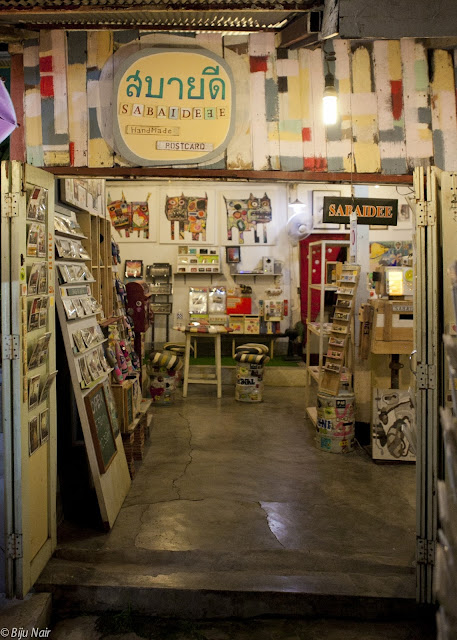 |
| Various Shops in the walking Street |
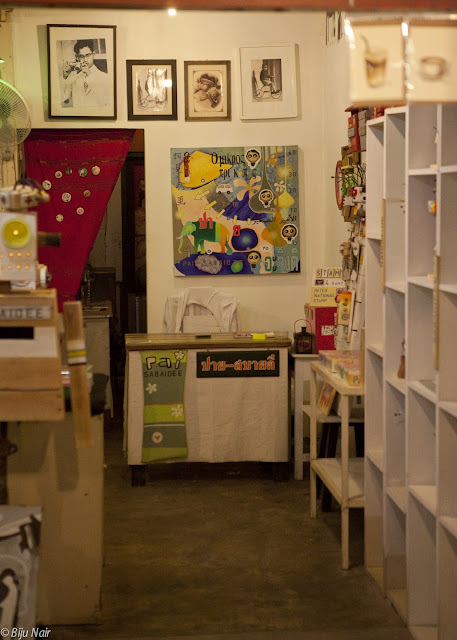 |
| Various Shops in the walking Street |
 |
| Various Shops in the walking Street |
 |
| Various Shops in the walking Street |
 |
| Various Shops in the walking Street |
 |
| Various Shops in the walking Street |
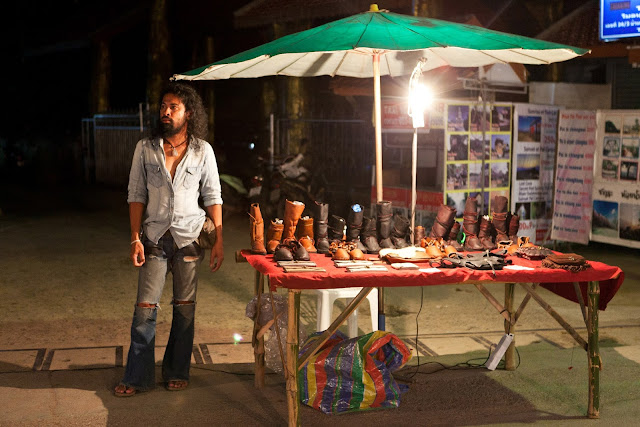 |
| Various Shops in the walking Street |
 |
| Various Shops in the walking Street |
 |
| Food stall, Walking Street, Pai |
